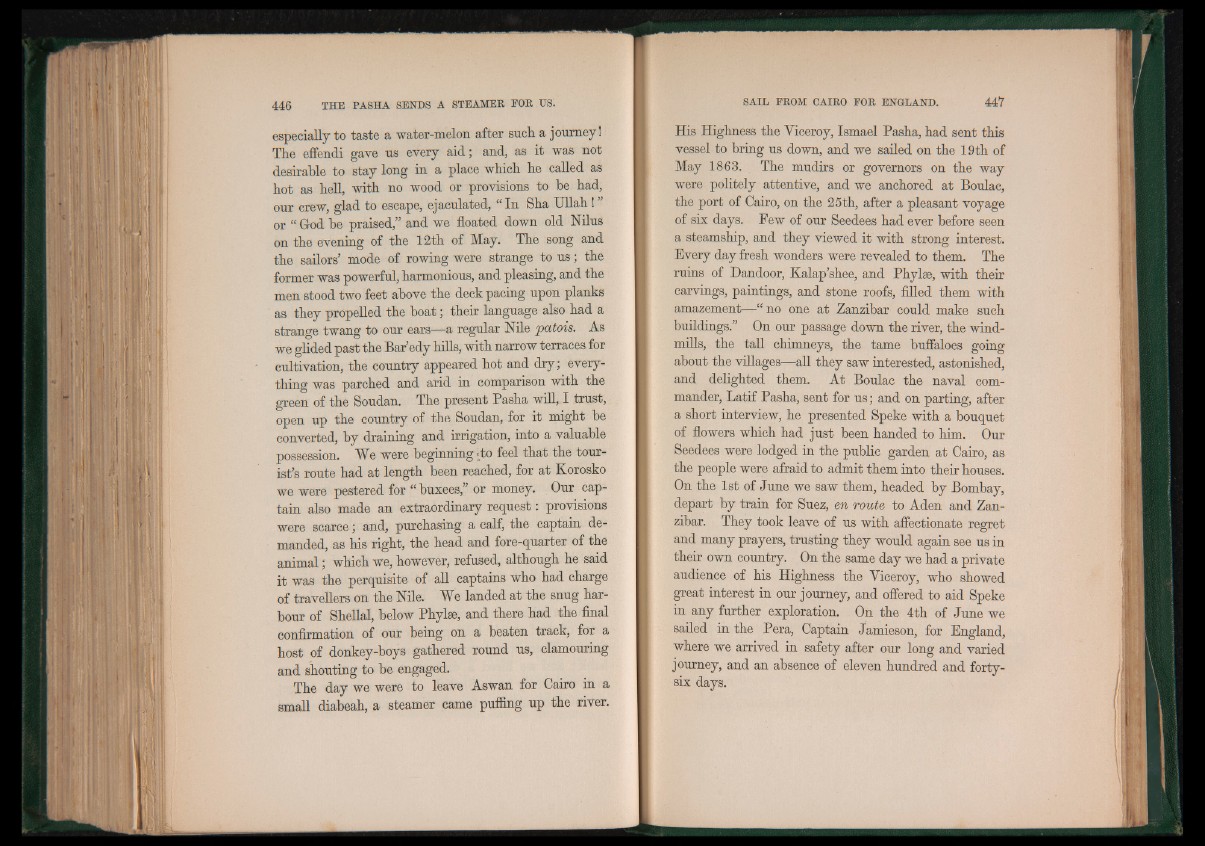
especially to taste a water-melon after such a journey!
The effendi gave us every aid ; and, as it was not
desirable to stay long in a place which he called as
hot as hell, with no wood or provisions to be had,
our crew, glad to escape, ejaculated, “ In Sha Ullah ! ”
or | God be praised,” and we floated down old Nilus
on the evening of the 12th of May. The song and
the sailors' mode of rowing were strange to u s ; the
former was powerful, harmonious, and pleasing, and the
men stood two feet above the deck pacing upon planks
as they propelled the boat; their language also had a
strange twang to our ears—a regular Nile patois. As
we glided past the Bar’edy hills, with narrow terraces for
cultivation, the country appeared hot and dry ; everything
was parched and arid in comparison with the
green of the Soudan. The present Pasha will, I trust,
open up the country of the Soudan, for it might be
converted, by draining and irrigation, into a valuable
possession. We were beginning >to feel that the tourist’s
route had at length been reached, for at Korosko
we were pestered for “ buxees,” or money. Our captain
also made an extraordinary request: provisions
were scarce; and, purchasing a calf, the captain demanded,
as his right, the head and fore-quarter of the
a n im a l ; which we, however, refused, although he said
it was the perquisite of all captains who had charge
of travellers on the Nile. We landed at the snug harbour
of Shellal, below Phylae, and there had the final
confirmation of our being on a beaten track, for a
host of donkey-boys gathered round us, clamouring
and shouting to be engaged.
The day we were to leave Aswan for Cairo in a
small diabeah, a steamer came puffing up the river.
His Highness the Viceroy, Ismael Pasha, had sent this
vessel to bring us down, and we sailed on the 19th of
May 1863. The mudirs or governors on the way
were politely attentive, and we anchored at Boulac,
the port of Cairo, on the 25th, after a pleasant voyage
of six days. Few of our Seedees had ever before seen
a steamship, and they viewed it with strong interest.
Every day fresh wonders were revealed to them. The
ruins of Dandoor, Kalap’shee, and Phylae, with their
carvings, paintings, and stone roofs, filled them with
amazement—“ no one at Zanzibar could make such
buildings.” On our passage down the river, the windmills,
the tall chimneys, the tame buffaloes going
about the villages—all they saw interested, astonished,
and delighted them. At Boulac the naval commander,
Latif Pasha, sent for us; and on parting, after
a short interview, he presented Speke with a bouquet
of flowers which had just been handed to him. Our
Seedees were lodged in the public garden at Cairo, as
the people were afraid to admit them into their houses.
On the 1st of June we saw them, headed by Bombay,
depart by train for Suez, en route to Aden and Zanzibar.
They took leave of us with affectionate regret
and many prayers, trusting they would again see us in
their own country. On the same day we had a private
audience of his Highness the Viceroy, who showed
great interest in our journey, and offered to aid Speke
in any further exploration. On the 4th of June we
sailed in the Pera, Captain Jamieson, for England,
where we arrived in safety after our long and varied
journey, and an absence of eleven hundred and forty-
six days.